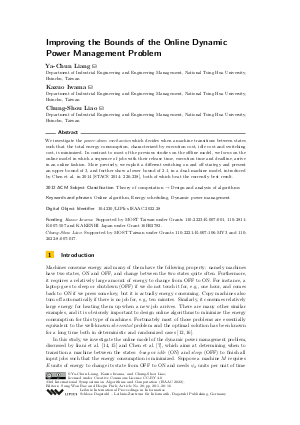Improving the Bounds of the Online Dynamic Power Management Problem
Authors Ya-Chun Liang, Kazuo Iwama, Chung-Shou Liao
-
Part of:
Volume:
33rd International Symposium on Algorithms and Computation (ISAAC 2022)
Part of: Series: Leibniz International Proceedings in Informatics (LIPIcs)
Part of: Conference: International Symposium on Algorithms and Computation (ISAAC) - License:
 Creative Commons Attribution 4.0 International license
Creative Commons Attribution 4.0 International license
- Publication Date: 2022-12-14
File

PDF
LIPIcs.ISAAC.2022.28.pdf
- Filesize: 0.77 MB
- 16 pages
Document Identifiers
Subject Classification
ACM Subject Classification
- Theory of computation → Design and analysis of algorithms
Keywords
- Online algorithm
- Energy scheduling
- Dynamic power management
Metrics
- Access Statistics
-
Total Accesses (updated on a weekly basis)
0PDF Downloads0Metadata Views
Abstract
We investigate the power-down mechanism which decides when a machine transitions between states such that the total energy consumption, characterized by execution cost, idle cost and switching cost, is minimized. In contrast to most of the previous studies on the offline model, we focus on the online model in which a sequence of jobs with their release time, execution time and deadline, arrive in an online fashion. More precisely, we exploit a different switching on and off strategy and present an upper bound of 3, and further show a lower bound of 2.1, in a dual-machine model, introduced by Chen et al. in 2014 [STACS 2014: 226-238], both of which beat the currently best result.
Cite As Get BibTex
Ya-Chun Liang, Kazuo Iwama, and Chung-Shou Liao. Improving the Bounds of the Online Dynamic Power Management Problem. In 33rd International Symposium on Algorithms and Computation (ISAAC 2022). Leibniz International Proceedings in Informatics (LIPIcs), Volume 248, pp. 28:1-28:16, Schloss Dagstuhl – Leibniz-Zentrum für Informatik (2022)
https://doi.org/10.4230/LIPIcs.ISAAC.2022.28
BibTex
@InProceedings{liang_et_al:LIPIcs.ISAAC.2022.28,
author = {Liang, Ya-Chun and Iwama, Kazuo and Liao, Chung-Shou},
title = {{Improving the Bounds of the Online Dynamic Power Management Problem}},
booktitle = {33rd International Symposium on Algorithms and Computation (ISAAC 2022)},
pages = {28:1--28:16},
series = {Leibniz International Proceedings in Informatics (LIPIcs)},
ISBN = {978-3-95977-258-7},
ISSN = {1868-8969},
year = {2022},
volume = {248},
editor = {Bae, Sang Won and Park, Heejin},
publisher = {Schloss Dagstuhl -- Leibniz-Zentrum f{\"u}r Informatik},
address = {Dagstuhl, Germany},
URL = {https://drops.dagstuhl.de/entities/document/10.4230/LIPIcs.ISAAC.2022.28},
URN = {urn:nbn:de:0030-drops-173138},
doi = {10.4230/LIPIcs.ISAAC.2022.28},
annote = {Keywords: Online algorithm, Energy scheduling, Dynamic power management}
}
Author Details
- Department of Industrial Engineering and Engineering Management, National Tsing Hua University, Hsinchu, Taiwan
- Department of Industrial Engineering and Engineering Management, National Tsing Hua University, Hsinchu, Taiwan
Funding
- Iwama, Kazuo: Supported by MOST Taiwan under Grants 110-2223-E-007-001, 110-2811-E-007-507 and KAKENHI Japan under Grant 16H02782.
- Liao, Chung-Shou: Supported by MOST Taiwan under Grants 110-2221-E-007-106-MY3 and 110-2622-8-007-017.
References
-
Susanne Albers and Antonios Antoniadis. Race to idle: new algorithms for speed scaling with a sleep state. ACM Transactions on Algorithms (TALG), 10(2):9, 2014.

-
Susanne Albers, Antonios Antoniadis, and Gero Greiner. On multi-processor speed scaling with migration. Journal of Computer and System Sciences, 81(7):1194-1209, 2015.

-
Antonios Antoniadis, Naveen Garg, Gunjan Kumar, and Nikhil Kumar. Parallel machine scheduling to minimize energy consumption. In Proceedings of the Fourteenth Annual ACM-SIAM Symposium on Discrete Algorithms, pages 2758-2769. SIAM, 2020.

-
Antonios Antoniadis, Chien-Chung Huang, and Sebastian Ott. A fully polynomial-time approximation scheme for speed scaling with sleep state. In Proceedings of the Twenty-Sixth Annual ACM-SIAM Symposium on Discrete Algorithms, pages 1102-1113. SIAM, 2015.

-
Nikhil Bansal, Tracy Kimbrel, and Kirk Pruhs. Speed scaling to manage energy and temperature. Journal of the ACM (JACM), 54(1):3, 2007.

-
Luca Benini, Alessandro Bogliolo, and Giovanni De Micheli. A survey of design techniques for system-level dynamic power management. IEEE transactions on very large scale integration (VLSI) systems, 8(3):299-316, 2000.

-
Jian-Jia Chen, Mong-Jen Kao, DT Lee, Ignaz Rutter, and Dorothea Wagner. Online dynamic power management with hard real-time guarantees. Theoretical Computer Science, 595:46-64, 2015.

-
Jian-Jia Chen and Tei-Wei Kuo. Procrastination for leakage-aware rate-monotonic scheduling on a dynamic voltage scaling processor. ACM SIGPLAN Notices, 41(7):153-162, 2006.

-
Jian-Jia Chen and Tei-Wei Kuo. Procrastination determination for periodic real-time tasks in leakage-aware dynamic voltage scaling systems. In Computer-Aided Design, 2007. ICCAD 2007. IEEE/ACM International Conference on, pages 289-294. IEEE, 2007.

-
Houssine Chetto and Maryline Chetto. Scheduling periodic and sporadic tasks in a real-time system. Information Processing Letters, 30(4):177-184, 1989.

-
Erik D Demaine, Mohammad Ghodsi, MohammadTaghi Hajiaghayi, Amin S Sayedi-Roshkhar, and Morteza Zadimoghaddam. Scheduling to minimize gaps and power consumption. Journal of Scheduling, 16(2):151-160, 2013.

-
Sandy Irani and Anna R. Karlin. Online Computation, pages 521-564. PWS Publishing Co., USA, 1996.

-
Sandy Irani and Kirk R Pruhs. Algorithmic problems in power management. ACM Sigact News, 36(2):63-76, 2005.

-
Sandy Irani, Sandeep Shukla, and Rajesh Gupta. Online strategies for dynamic power management in systems with multiple power-saving states. ACM Transactions on Embedded Computing Systems (TECS), 2(3):325-346, 2003.

-
Sandy Irani, Sandeep Shukla, and Rajesh Gupta. Algorithms for power savings. ACM Transactions on Algorithms (TALG), 3(4):41, 2007.

-
Anna R Karlin, Mark S Manasse, Larry Rudolph, and Daniel D Sleator. Competitive snoopy caching. Algorithmica, 3(1):79-119, 1988.

- Ya-Chun Liang, Kazuo Iwama, and Chung-Shou Liao. Improving the bounds of the online dynamic power management problem, 2022. URL: http://arxiv.org/abs/2209.12021.
-
Adam Wierman, Lachlan Leicester Henry Andrew, and Minghong Lin. Speed scaling: An algorithmic perspective, pages 385-406. CRC Press, 2012.

-
Frances Yao, Alan Demers, and Scott Shenker. A scheduling model for reduced cpu energy. In Foundations of Computer Science, 1995. Proceedings., 36th Annual Symposium on, pages 374-382. IEEE, 1995.

